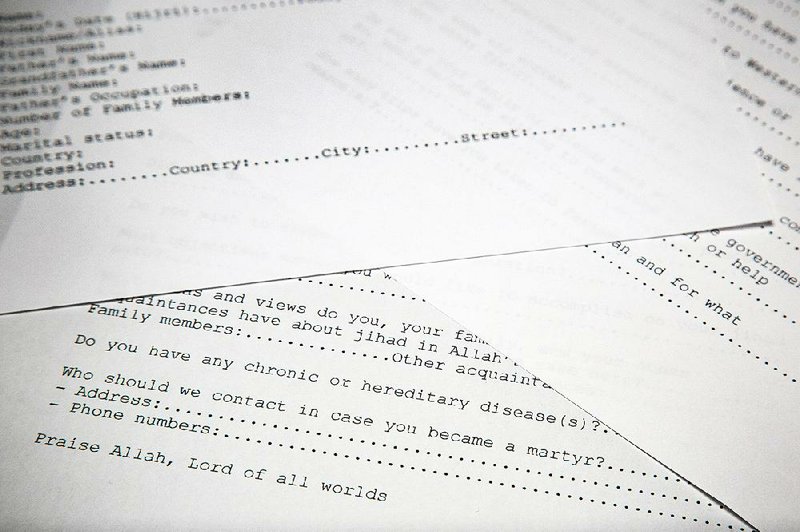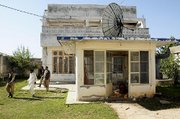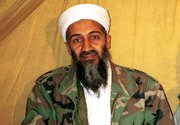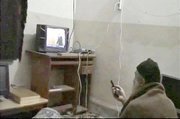WASHINGTON -- Osama bin Laden kept an extensive library of English-language books in the compound where he was killed in 2011, a collection whose titles appear to reflect the al-Qaida leader's constant search for U.S. vulnerabilities and insights into troubled American military campaigns.
Bin Laden's bookshelf included Imperial Hubris, an account of U.S. counterterrorism programs by the former head of the CIA unit that was responsible for tracking the al-Qaida leader. Other books included a copy of Obama's Wars by Bob Woodward, a history of the Federal Reserve, and a book on "antiaircraft weapons and techniques for guerrilla forces."
The list of books was part of a broader collection of materials from bin Laden's compound in Pakistan that was declassified and released Wednesday by the Office of the Director of National Intelligence.
The release comes after years of pressure on President Barack Obama's administration to declassify material seized from bin Laden's compound. Last year, Congress directed the Office of the Director of National Intelligence to review the material and make public as much as possible.
The materials are a "sizeable tranche of documents recovered during the raid on the compound used to hide Usama bin Ladin," the intelligence office said in a statement, using an alternate spelling of bin Laden's name. The statement said U.S. agencies are "reviewing hundreds more documents in the near future for possible declassification and release."'
The review, which began in May 2014, is likely to continue through the summer and into the fall, said Jeffrey Anchukaitis, a spokesman for the intelligence office. But the White House asked that the office and the CIA begin releasing material immediately because of "the increasing public demand to review those documents," he said.
Much of what was taken from the compound remains classified.
Most of the documents appear to be letters and notes between bin Laden and his top deputies. There is talk of training new recruits, and how to select the most talented to carry out major attacks in the West. There are discussions of who should be promoted and the perceived strengths and weaknesses of those seeking to move up al-Qaida's chain of command.
There was also a mix of religious texts, think-tank studies, software manuals and news articles gathered by Navy SEALs in the aftermath of the raid in which bin Laden was killed.
'Uproot' American trunk
The documents, translated by U.S. intelligence officials, mix the mundane language of business -- personnel training, budget matters, financing for "workshops and collaborating groups" -- with fervent religious appeals and updates on terrorism plots.
"Uproot the obnoxious tree by concentrating on its American trunk," bin Laden writes in a letter urging al-Qaida affiliates in North Africa to avoid becoming distracted by fighting local security forces and to avoid Muslim infighting.
A 2010 letter written by Atiyah Abd al-Rahman, a top deputy to bin Laden, describes a plan by al-Qaida to seek a truce with the government of Yemen, long a base for the terrorist group, or to send a message to the government through mediators "to leave 'us' alone in exchange of focusing on America."
"The purpose is to focus on striking inside America and its interests abroad especially oil-producing countries to agitate public opinion and to force U.S. to withdraw from Afghanistan and Iraq," the letter said.
One memo, citing drought in Africa and floods in Pakistan, expressed concern about climate change. It said studies have found it will affect more people than are "victimized by war, for which the states recruit their strongest men, offer their best training and slash major portions of their budgets."
The documents include a job application for al-Qaida candidates that has questions about education and hobbies but also asks: "Do you wish to execute a suicide operation?" It requests an emergency contact in case the applicant becomes a martyr.
Drone strikes against al-Qaida leaders in Pakistan, the near-suffocation of the group's affiliate in Iraq beginning in 2007, and other developments severely undercut bin Laden in the years before his death. The terrorist threat shifted to al-Qaida affiliates in other areas, including in Yemen and North Africa. U.S. officials have said that at the time of bin Laden's death, he no longer exercised the same level of control over al-Qaida he once had.
A May 2007 letter to bin Laden from "the Jihad and Reform Front" implores him to disavow "the ongoing catastrophes and disasters" committed by al-Qaida in Iraq, the forerunner of today's Islamic State group, which strayed from al-Qaida's orders with its brutal attacks on fellow Muslims.
"If you still can, then this is your last chance to remedy the Jihad breakdown that is about to take place in Iraq," the letter warns bin Laden.
Al-Qaida did reject the splinter group, but the Islamic State kept growing, and after bin Laden's death it went on to seize a swath of Syria and Iraq, killing Muslims and Christians, beheading Westerners and drawing warplanes from a U.S.-led international coalition to the region.
At one point, an undated "Report on External Operations" presented bin Laden with a litany of excuses for failure to reach al-Qaida's violent goals for the year, including orders to kill Jews.
"First of them was bad luck and God wasn't on our side," it says, before running through complaints about a lack of well-trained personnel, poor communications, trouble with transportation, insufficient weapons and difficulty evading security forces.
"We are not asking for a convenient atmosphere to work ... but God knows that we have not done our best to create the correct atmosphere of work to reach our goal," the report says.
The failed plots mentioned in the report included targets in "Russia (exploding the gas line or the American embassy)," and the United Kingdom, as well as Americans in Denmark, where a European group "formed of 3 brothers" was sent to carry out an operation.
One letter from bin Laden mocks President George W. Bush's "war on terror" after the Sept. 11, 2001, terrorist attacks, saying it had not achieved stability in Iraq or Afghanistan and questioning why U.S. troops were "searching for the lost phantom" -- weapons of mass destruction in Iraq. No date is on the U.S. translation.
'Exhausted' hosts
The materials reveal as much about bin Laden's years in forced solitude than they do about the organization that initiated the terrorist attacks that killed almost 3,000 Americans.
Some of the most compelling messages in the collection describe the toll of that existence, including the letter that he composed in 2011 to his wife Khairiyah, who was among a contingent of family members who had taken refuge in Iran. In the letter, which voiced deep frustration with the isolation at his compound, the al-Qaida leader contemplated moving.
Bin Laden in the three-page document recounts his efforts to reunite his family but says his proposals for doing so were rejected by Abu Ahmed al-Kuwaiti and his brother, who were responsible for protecting the al-Qaida leader and whose families also lived at the compound.
"They are getting exhausted -- security wise -- from me staying with them and what results from that," bin Laden wrote. "They have reached a level of exhaustion that they are shutting down, and they asked to leave us all," bin Laden wrote.
"I think that I have to leave them," he continued. "But it will take a few months to arrange another place," he said, where his third wife, son Hamza and other family members "can join us."
Bin Laden wrote that he proposed compromises, including allowing Khairiyah to visit only temporarily, or having her replace one of the other residents so the number of people staying at the compound would not increase.
The brothers appear to have relented, at least in part. Khairiyah arrived in Abbottabad, Pakistan, just months before the SEAL raid. But Hamza did not go. He remains at large.
U.S. officials said they believe bin Laden could understand and read English at least at a basic level. His collection was dominated by nonfiction volumes on subjects as varied as ballot tampering in U.S. elections and the scale of U.S. assistance to Pakistan.
His other books included Killing Hope: U.S. military and CIA Interventions since World War II and The New Pearl Harbor, about the response of Bush's administration to the 2001 terrorist attacks.
One of the odder entries in the collection is A Brief Guide to Understanding Islam.
Several copies of the magazine Foreign Policy were found in the compound, along with publications such as the Los Angeles Times, Newsweek, Popular Science and U.S. News and World Report.
Bin Laden also collected about 30 computer manuals and had 19 reports on France's economy and military capabilities.
The raid also turned up documents believed to be used by other members of the bin Laden household, such as a video game guide for Delta Force: Xtreme 2, a multiplayer video game that depicts military combat scenarios.
U.S. special operations forces also found an Arabic dictionary and grammar book, as well as a guide to healthy eating for wrestlers titled, The Grappler's Guide to Sports Nutrition.
Information for this article was contributed by Greg Miller and Julie Tate of The Washington Post; by Connie Cass and Robert Burns of The Associated Press; by Brian Bennett of Tribune News Service; by Matthew Rosenberg of The New York Times; and by Nicole Gaouette, David Lerman, Justin Sink and Terry Atlas of Bloomberg News.
A Section on 05/21/2015



